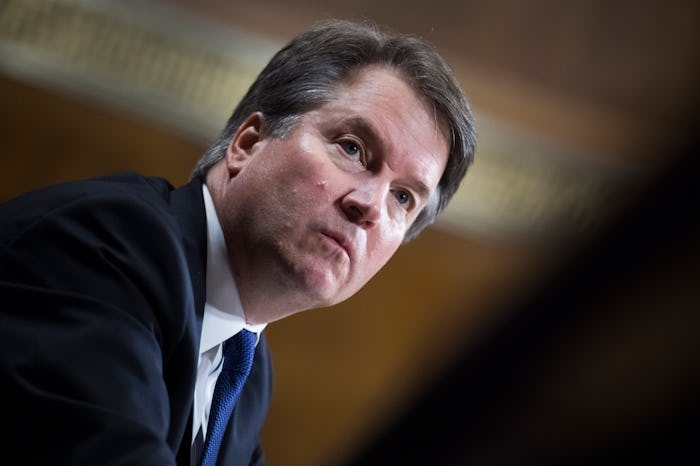News

There's Still One More Way To Stop Kavanaugh, But It's Up To All Of Us
On Thursday morning, Judge Brett Kavanaugh cleared yet another hurdle on his way to the Supreme Court. It looks increasingly likely that Senate Republicans are willing to set aside the multiple accusations of sexual misconduct and confirm their party leader's pick, so if and when he is confirmed, can Kavanaugh be removed from the Supreme Court? Many questions about his alleged sexual misconduct have yet to be answered, and perhaps they never will, but what happens if he's already on the bench when they do, and it turns out he's guilty? Even a president can theoretically be removed from office — although, as we've seen, that's much easier said than done — but can a Supreme Court justice be impeached?
Last week, the Senate Judiciary Committee heard testimony from Dr. Christine Blasey Ford, who alleges that Kavanaugh attempted to rape her at a house party in the early 1980s while the two were high school students. Kavanaugh then rebutted Ford's account of the event before the committee, and it didn't really change anything; Republicans on the committee were quick to excuse Kavanaugh's often erratic behavior at the hearing, as well as his "high school antics," while Democrats believed the alleged victim. Then, a bright spot: on Friday, after the committee voted to approve Kavanaugh's nomination, Arizona Sen. Jeff Flake, one of the few Senate Republicans known for standing up to the president, called for an FBI investigation into Ford's claims and another sexual assault allegation by Kavanaugh's college classmate, Deborah Ramirez.
Without abiding by Flake's call for an investigation before the full Senate vote, Kavanaugh's fate was up in the air; fellow Republican Sens. Susan Collins of Maine and Lisa Murkowski of Alaska have also occasionally voted with Democrats; if all three voted against Kavanaugh, Vice President Mike Pence wouldn't even be able to push the confirmation through with a tiebreaker vote, as he's done in the past. "I think it would be proper to delay the floor vote for up to but not more than one week in order to let the FBI continue — to do an investigation, limited in time and scope to the current allegations that are there," Flake said at the time, according to the Washington Post. But a week is hardly long enough to get to the bottom of two separate decades-old incidents, and the investigation was further hampered by limitations put in place by the White House.
The FBI did not conduct a criminal investigation of Kavanaugh; it conducted a supplementary background check, and even that was severely limited. Background checks are done on behalf of the White House, not the people, and as such, the White House determines the scope, up to and including which witnesses the FBI can interview, according to NBC News. On Saturday, Trump disputed that fact, tweeting that he wanted the FBI to "interview whoever they deem appropriate, at their discretion," but apparently he didn't want it enough to bother instructing the White House counsel's office to allow it.
Only 10 witnesses were interviewed during the course of the investigation, according to The Hill. Deputy Press Secretary Raj Shah admitted on CNN Thursday morning, that initially, the White House counsel had only instructed the FBI to contact four individuals, but generously allowed the bureau to follow a few leads. Still, Ford and Kavanaugh themselves were left off the list, as well as at least 20 more corroborating witnesses whose names Ramirez provided to the FBI, according to Time. The investigation, unsurprisingly, turned up no new evidence.
The Senate is expected to vote on Kavanaugh's appointment Friday, and Flake is reportedly satisfied with the meager investigation's results. Collins and Murkowski were more ambiguous with their comments on the matter, according to the Washington Post, but it's likely that all three will vote to confirm. But here's the good news: even then, it's still not over. Article II, Section 4 of the U.S. Constitution, which allows for impeachment based on "Treason, Bribery, or other high Crimes and Misdemeanors" applies not just to the president, but also the vice president and "all civil Officers of the United States," including Supreme Court Justices. And now for the bad: unless Democrats win control of both the House and the Senate in November, that's never going to happen. You know what's coming next, right? Register to vote right this minute, if you haven't already, and cast your ballot in every single election, because they are all incredibly important. Our nation's future depends on it.